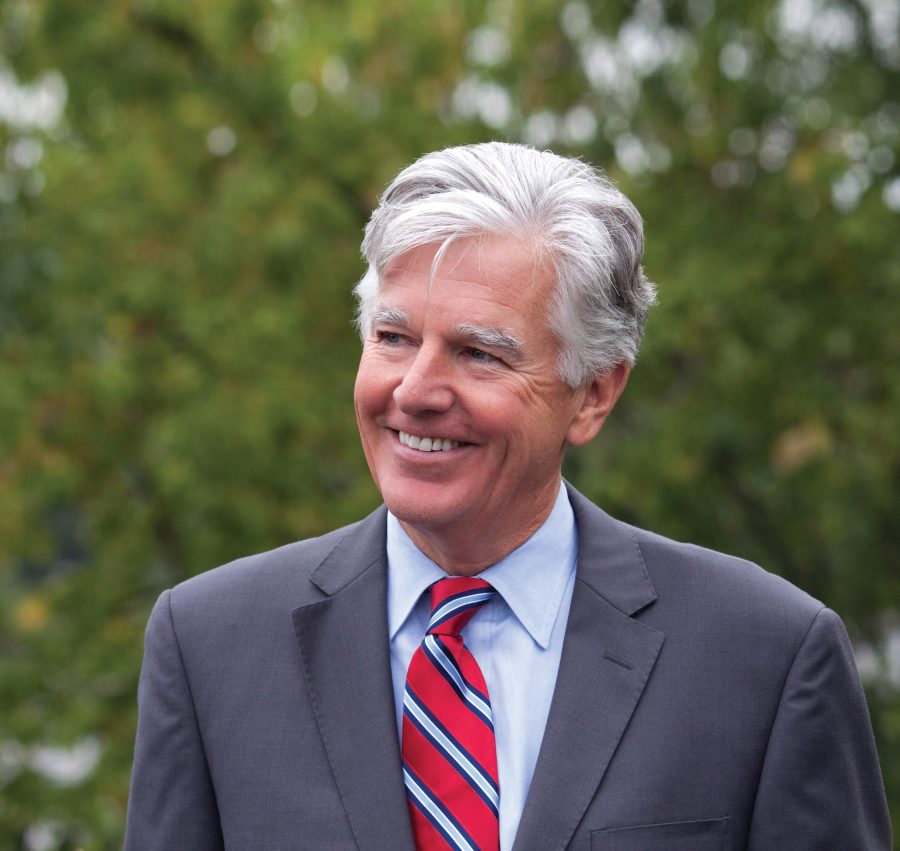On the evening of March 5, Marty Meehan, president of the University of Massachusetts system, led the second annual State of the University address at the UMass Club in Boston. During his address, Meehan spoke about the school’s accomplishments and the challenges the state’s public university system is facing.
Robert Manning, chairman of the UMass Board of Trustees, opened for Meehan who spoke to a room of an estimated 300 people.
Attendees included Governor Charlie Baker and Lieutenant Governor Karyn Polito, as well as Senate President Harriette Chandler and Speaker of the House Robert DeLeo.
Meehan described the five separate campuses as “one community in service to the Commonwealth, the nation, and the world.” Meehan declared that “the State of the University of Massachusetts is strong, and only getting stronger,” pointing to rises in enrollment close to 75,000 students.
Meehan also pointed to various achievements of the campuses, including UMass Boston’s largest Welcome Day in its history, UMass Lowell ranked as number five on a national list of growing public research universities, and the UMass Medical School training more doctors than in the school’s history.
Meehan also highlighted the UMass School of Law, pointing out the highest bar passage rate, which Meehan commented was higher than three of Massachusetts’ privately accredited law schools. This comes after only one year of full accreditation by the American Bar Association.
Additional achievements listed by Meehan ranged from academics to research in various fields, which Meehan concluded by saying “it’s clear that we have plenty to be proud of.” These accomplishments, he said, “validate the hard work of our students, faculty and staff.” These, Meehan said, “serve as proof that more and more families recognize the value and quality of a UMass education.”
After speaking on the system’s successes, the president made it clear that there was still more room to improve.
“The cost of a UMass education has shifted from the state to students and their families,” said the president. He explained how the state’s shrinking budget has effected the UMass system. In contrast, Meehan said that as an undergraduate at UMass Lowell, “the state covered more than 80 percent of the school’s budget.”
Meehan described this not as a Massachusetts issue, but as a national trend, where states are “squeezed by healthcare costs, local aid, and other priorities.”
Meehan also announced the 2018 President’s Scholarship, which was awarded to UMass Lowell junior, Timi Ogunjobi, a major in mechanical engineering. Meehan said that Ogunjobi has had to “overcome considerable financial challenges.” The scholarship will pay for the remaining tuition for Ogunjobi’s senior year.
The UMass system “remains more affordable than most,” said Meehan. The president said that the system has been using multiple ways to try and keep costs down, including planning and data analysis to expedite decisions regarding budget. In addition to working to get more financial aid, Meehan said that the administration has been working with the current gubernatorial administration and two-year colleges in an effort to get through college quickly and affordably.
Other programs put in place by the system have included financial literacy, internship assistance, and emergency funding.
Despite new programs, Meehan said he “recognize[s] that being more affordable than most isn’t good enough.” He added that “we must work proactively and collaboratively to do more.”
Meehan said that he has several focuses going forward to improve student success and affordability.
His first focus is to get more online classes. These can reach “working adults, people with incomplete college credit, and others seeking to advance their careers,” who may be harder to reach. These will generate “new revenue to hold costs down for all of our students,” said Meehan.
The second focus is to build more partnerships with non-profit organizations that help incoming low-income students. Meehan announced that UMass partnered with The Base, a non-profit that works with urban youth. According to Meehan, the group has already helped more than 8,000 youth. Through the partnership, accepted Base students receive mentoring, development programs, and scholarships.
A third focus is to get private business investors, as part of Meehan’s Corporate Endowment Initiative. Meehan hopes to work with Massachusetts’ largest employers on securing more paid internships and co-ops, in addition to direct investment for scholarships. Meehan also hopes that the system can work out debt repayment and tuition assistance opportunities.
In this scenario, companies benefit from recruitment and retention of undergraduates. Meehan citing current investors, Kronos and Raytheon “will tell you that their businesses are better for it.”
Meehan’s fourth focus is to reduce student cost and increase funding towards the system’s financial aid endowment. This money could help get more scholarships for needy students. Meehan challenged each campus to raise $200 million over the next 10 years that would be dedicated towards the endowment. Meehan said that the combined effort would double the existing endowment and could generate 4,000 scholarships to students yearly.





















































